Categories: Blockchain
What are ethereum smart contracts? Examples of smart contracts on blockchain
Ethereum smart contracts revolutionize the way agreements are executed and enforced. By leveraging blockchain technology, they ensure automatic, transparent, and tamper-proof execution of terms. The benefits of Ethereum smart contracts include increased efficiency, reduced costs, and enhanced security, making them ideal for applications in finance, supply chain management, and beyond.
In the ever-evolving world of blockchain, Ethereum emerges as a pioneering platform with its support for smart contracts. These self-executing code segments are revolutionizing how we conduct transactions and agreements, offering unprecedented transparency, security, and efficiency. Let's delve into what Ethereum smart contracts are, how they work, and the real-world applications that are transforming our world.
Table of Contents
What are ethereum smart contracts?
Ethereum smart contracts are automated agreements where contract terms are encoded into lines of code. Operating on the Ethereum blockchain, a decentralized and secure platform, these contracts execute automatically when specific conditions are met, eliminating intermediaries and enhancing transaction efficiency and security.
Written in Solidity, a language similar to JavaScript, smart contracts specify conditions for contract execution and actions like transferring digital assets between parties. Their automation capability reduces human errors and saves time, making them suitable for various industries such as banking, real estate, and supply chain management.
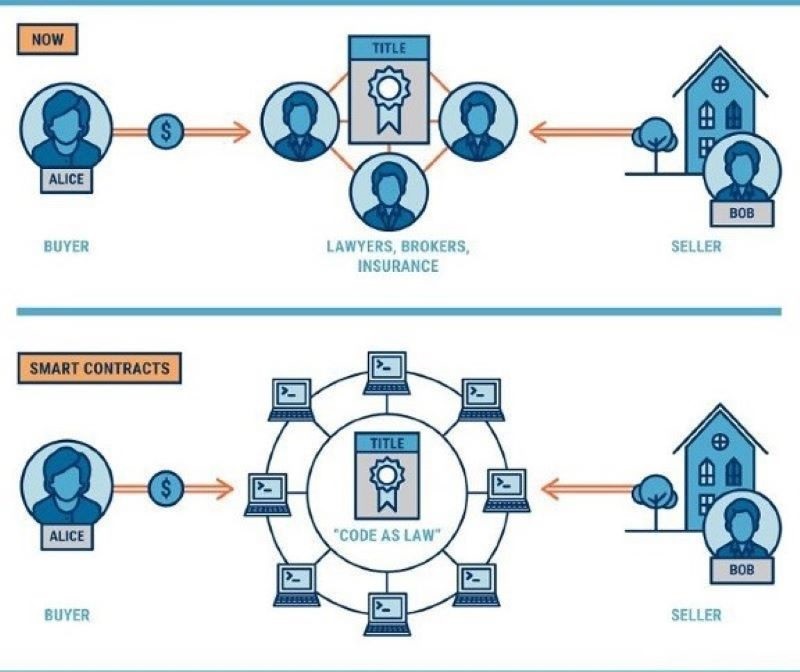
Examples of ethereum smart contracts on blockchain
Several companies have integrated Ethereum smart contracts into their operations to enhance efficiency and security across various business processes:
Microsoft: Utilizes smart contracts to manage software licensing, automating the issuance and payment of royalties to developers. This reduces disputes, ensures developers are fairly compensated, and brings transparency to the licensing process.
JPMorgan Chase: Leverages smart contracts to automate complex derivative transactions, minimizing risk and speeding up processing times. Smart contracts are also used to manage cross-border payments, reducing costs and increasing efficiency.
Accenture: Applies smart contracts to build more efficient Know Your Customer (KYC) and Anti-Money Laundering (AML) systems. By automating identity verification and transaction monitoring processes, smart contracts help reduce fraud risk and ensure regulatory compliance.
ING: The bank has used smart contracts to create a digital commodity trading platform, enabling parties to trade commodities securely and transparently.
Maersk: The shipping company has deployed a blockchain platform using smart contracts to track and manage the supply chain, improving the transparency and efficiency of the shipping process.
UBS: The bank issued a digital bond based on smart contracts, helping to reduce issuance costs and increase liquidity for investors.
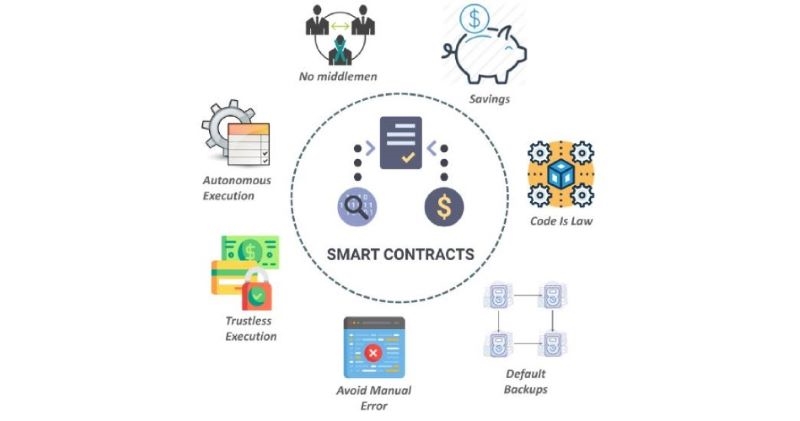
To embark on implementing Ethereum smart contracts, companies must first grasp Ethereum and blockchain fundamentals. Educating themselves on Ethereum blockchain, smart contracts, and the Solidity programming language is crucial. Additionally, assembling a skilled development team experienced in Ethereum and blockchain technology is essential. This team will be pivotal in developing, testing, and deploying smart contracts.
Selecting a suitable development environment like Remix, Truffle, or Ganache is the next step for building and testing smart contracts. Once developed, companies can deploy these contracts on the Ethereum blockchain to automate business processes, enhance transparency, bolster security, and reduce costs. With proper resources and commitment, any company can harness the potential of decentralized technology through Ethereum smart contracts.
Types of Smart Contracts
- Smart Legal Contracts: These combine traditional legal terms with smart contract technology to automate contract enforcement, minimize risks, and enhance transparency.
- Decentralized Autonomous Organizations (DAO): These are self-managed organizations governed by rules encoded in smart contracts. DAOs enable decentralized and transparent decision-making, eliminating the need for intermediary entities.
- Distributed Applications (DApps): These are applications running on blockchain networks, utilizing smart contracts to perform core functions. DApps can include financial applications, games, social networks, or any other type of application.
- Smart Contracting Devices: These integrate smart contracts with Internet of Things (IoT) devices to create automated and intelligent systems. For instance, a smart contract could be used to automatically pay for energy usage based on data from smart meters.
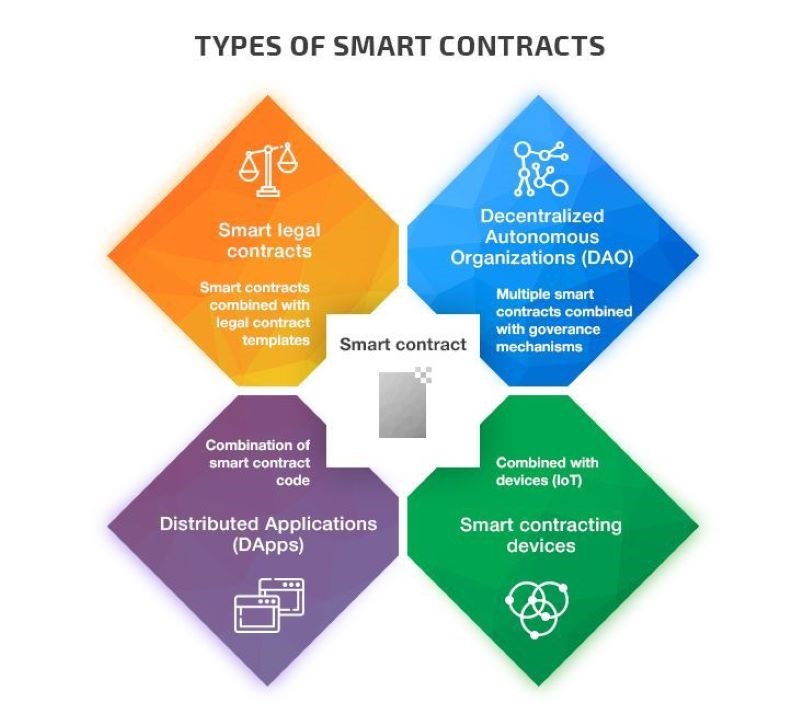
How do ethereum smart contracts work?
Ethereum smart contracts operate by automating the execution of predefined conditions triggered by events, like fund transfers. These conditions are encoded in the contract's code and enforced automatically upon fulfillment. For example, a smart contract can release payment to a seller only after the buyer confirms receipt of goods, ensuring terms are met without intermediaries.
In practice, the process involves:
- Agreement on sale terms between buyer and seller, such as price and delivery date.
- Buyer sends cryptocurrency (usually Ether) to the smart contract's address.
- Smart contract verifies conditions (e.g., receipt of cryptocurrency).
- Upon verification, smart contract automatically executes terms, transferring product ownership to the buyer.
- Both parties trust the contract's enforcement, with Ethereum blockchain recording transaction details securely and permanently.
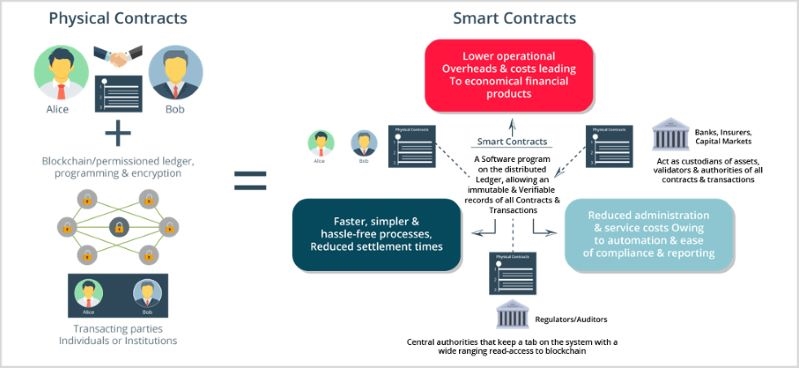
By using smart contracts, the risk of fraud and the need for intermediaries is reduced, and the process of buying and selling products is streamlined and automated.
How to use smart contracts for business
Identify Use Cases: Determine specific business processes or transactions that can benefit from automation and transparency provided by smart contracts. Examples include supply chain management, payment processing, and digital asset management.
Understand Blockchain and Ethereum: Educate yourself and your team about blockchain technology, particularly Ethereum, which supports smart contracts. Understand how smart contracts function on the blockchain and their advantages over traditional methods.
Define Contract Terms: Clearly define the terms and conditions that the smart contract will enforce. This includes identifying triggers (conditions that initiate contract execution) and actions (what happens when conditions are met).
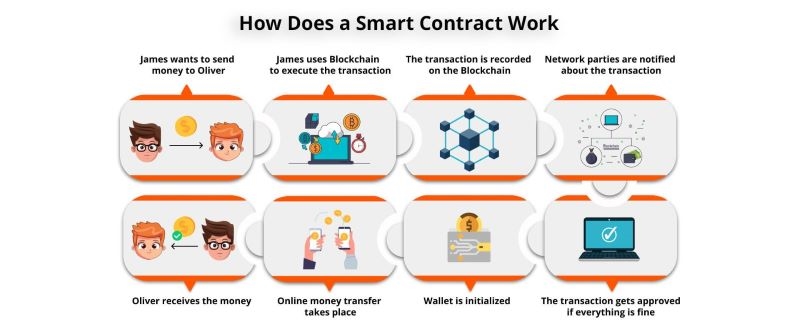
Develop Smart Contracts: Hire or train developers with expertise in Solidity (Ethereum's smart contract programming language) to write and deploy smart contracts. Use development environments like Remix, Truffle, or Ganache for coding, testing, and debugging.
Testing and Deployment: Thoroughly test smart contracts in a sandbox environment to ensure they function as intended and are free from vulnerabilities. Once tested, deploy them on the Ethereum blockchain or a suitable testnet.
Integration and Adoption: Integrate smart contracts into your existing business processes and systems. Ensure stakeholders understand how to interact with and benefit from smart contracts. Provide training if necessary.
Monitor and Maintain: Regularly monitor smart contracts for performance and security. Implement upgrades or fixes as needed to adapt to changing business requirements or blockchain updates.
Compliance and Legal Considerations: Ensure smart contracts comply with relevant laws and regulations. Consider legal implications of automated contract execution and seek legal counsel if necessary.
The technology behind ethereum smart contracts
The technology behind Ethereum smart contracts is anchored in the Ethereum blockchain, a decentralized and distributed ledger that securely records transactions and data. Smart contracts are self-executing computer programs deployed on the Ethereum blockchain to enforce agreement terms automatically.
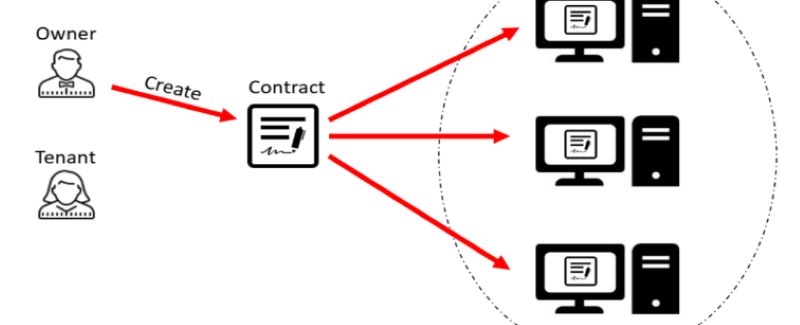
Developers write these contracts in high-level programming languages, compiling them into low-level bytecodes stored on the Ethereum blockchain. The Ethereum Virtual Machine (EVM), a decentralized computer network, executes this bytecode. When users initiate transactions on Ethereum, these actions trigger smart contracts to enforce predefined agreement terms.
The ledger's decentralized and distributed nature ensures the security and transparency of agreement terms, with transaction details stored on multiple computers for auditability by anyone. Smart contracts enable the automation of diverse agreements and transactions, mitigating fraud risk and reducing reliance on intermediaries.
The Future of Smart Contracts
The future of smart contracts on Ethereum and other blockchains is opening up promising prospects. With continuous technological development, smart contracts are expected to address current challenges and expand applications into many new fields.

Layer 2 Scaling Solutions: Solutions like U2U Network, with its advanced DAG-based U2U Chain offering an efficient consensus mechanism and high scalability, are being developed to solve Ethereum's scalability issues, helping to reduce costs and increase transaction speeds.
Diverse Applications: Smart contracts will be more widely applied in areas such as healthcare (medical record management, pharmaceutical supply chain tracking), education (issuance of digital degrees and certificates), energy (automation of energy transactions), and many other fields.
Integration with New Technologies: The combination of smart contracts with artificial intelligence (AI) and the Internet of Things (IoT) will create breakthrough applications. For example, smart contracts can integrate with AI to automatically analyze and execute complex contract terms, or integrate with IoT to create automated systems and intelligent asset management.
Ethereum smart contracts are not just a groundbreaking technology but also a significant step towards building a more decentralized and transparent future. With their ability to automate, eliminate intermediaries, and minimize risks, smart contracts are unlocking new opportunities across various sectors, from finance and real estate to supply chains and beyond.
However, challenges remain to be addressed, particularly regarding scalability and transaction costs. Solutions like U2U Network, with its advanced DAG-based U2U Chain and innovative consensus mechanism, are being developed to tackle these issues. U2U Network's unique architecture enables high scalability and low transaction costs, promising to drive wider adoption of smart contracts in the future. We can anticipate a world where smart contracts become an integral part of daily life, creating a business and transactional environment that is more efficient, fair, and reliable.
.png)